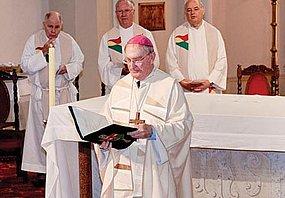By Madonna King
The Drum
May 3, 2011
http://www.abc.net.au/news/stories/2011/05/03/3206333.htm
 |
| Bishop William Morris (foreground) celebrates the thanksgiving mass for the Canonisation of St Mary MacKillop, November 13, 2011. |
The Vatican's decision to remove William Morris as the Bishop of Toowoomba in Queensland says much about the direction of the Roman Catholic Church, and the followers it wants.
Bishop Bill, as he's called by locals, is on the wrong side of 65, and has led the Darling Downs parish for more than 18 years.
Last night, after refusing to resign, he was told time was up; that his leadership was faulty and not in accordance with the Church's teaching.
The Vatican's decision, two years after another Catholic priest Peter Kennedy was stripped of his priesthood, has prompted warnings local "temple police" are monitoring church services, and reporting any deviance from Church teachings, direct to Rome.
Bishop Morris has spoken publicly on issues relating to the church, but a trawl through the files suggests he is neither a rebel nor a dissident. It seems his complainants' chief evidence is a newsletter he put out five years ago; prompting an investigation into his teachings, and now his removal.
The newsletter is tame, but raises the issue of the number and age of priests, saying that 8 of the 14 priests in the parish in 2014 would be aged over 66. Another three would be over 61.
"Several responses have been discussed internationally, nationally and locally," he says, including ordaining married, single or widowed men, welcoming former priests back, ordaining women, married or single, and recognising Anglican, Lutheran and Uniting Church orders.
"While we continue to reflect carefully on these options, we remain committed to actively promoting vocations to the current celibate male priesthood and open to inviting priests from overseas."
It hardly seems the teachings of a rebel, nor does it actively campaign for the ordination of women priests, but Bishop Morris says those are the issues Pope Benedict XV1 had raised.
He says the decision to remove him comes without natural justice, any right of appeal, or even the ability to address the specific accusations made against him.
The Catholic Church (like any organisation) has its rules and expulsion is often the price for breaking the rules. But Bishop Morris's supporters privately point to the role of a small group of conservative Catholics determined the rules should be religiously enforced. That means no oxygen from the pulpit for controversial topics like female ordination.
Peter Kennedy, who wrested a healthy Sunday congregation from the Catholics when he was sacked, says it was a similar group that went to Rome to complain about him - and he warns they are acting in other parishes, taking notes during sermons and using them as the substance of complaints to the Vatican.
That raises a problem for the Church - because that small group might reflect the ideological orthodoxy of the Church in Rome, but not the broad-ranging opinions in congregations, schools and homes across Australia - where parents champion free speech and tell their Catholic daughters they can achieve anything.
But there are bigger issues here too: the focus the Church is putting on a Bishop raising something like female ordination (not advocating it, but raising it), over the emphasis it puts on rebuilding the Church's reputation in the wake of serial sex abuse.
That was not lost on some of Bishop Morris' supporters, and he has told colleagues he had wanted to stay on to deal with ongoing cases and ensure victims were looked after.
The cloak of secrecy, behind which these investigations are conducted, is also a problem for the Church; as voters and shareholders demand more and more accountability in government and corporate life, parishioners will demand the same.
But a more basic question exists here too. What does the Catholic Church do about declining numbers, in both its flock and its priests? And can it afford to stay strong and lure young people if it doesn't address the issue of women ordination?
Discussing it isn't accepting - but it's a sign of an open and accountable organisation willing to engage its members. The move by the Vatican last night shows it is neither accountable for the decisions it makes, nor willing to listen to many of its members.
It's ironic that it happened on the day the news centred on the beatification of John Paul II, a leader who marked his papacy and the last quarter century of his life by standing up for what he believed in - even when it involved facing down those who wanted to stifle dissent.
Any original material on these pages is copyright © BishopAccountability.org 2004. Reproduce freely with attribution.